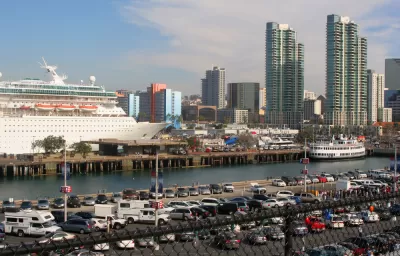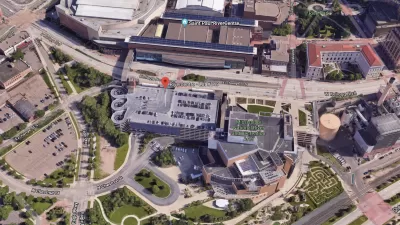A proposed code amendment would expand parking reforms implemented by San Diego in 2019.

Almost exactly two years after San Diego voted to eliminate parking requirements for new multi-family residential developments in designated Transit Priority Areas around the city, a new proposal would expand parking reform to "non-residential land uses" in those same areas.
An article by Dan Griffin provides the only existing local news coverage of the proposed change, which appeared before the city Planning Commission on June 3 and is expected for a City Council vote in July. Griffin's article mostly shares the viewpoints of local business owners about perceptions of an existing lack of parking near their neighborhoods, although one restaurant owner is quoted saying that the city's outdoor dining program allowed their café to stay in operation during the pandemic.
According to the item prepared for the Planning Commission, the parking policy reform code amendment "is complimentary to other City initiatives, such as Complete Communities and the Climate Action Plan, and is aimed at reducing dependency on single occupancy vehicle use and greenhouse gas emissions and supporting investments in transit and active transportation."
San Diego is once again carrying the banner for parking reform, but the number of cities also pursuing parking reforms is increasing almost weekly. Just in the past couple of weeks, Richmond, Virginia and Raleigh, North Carolina also took steps toward eliminating parking requirements.
FULL STORY: San Diego Considers Eliminating Parking Space Requirements to Save Businesses Money, Reduce Pollution

Planetizen Federal Action Tracker
A weekly monitor of how Trump’s orders and actions are impacting planners and planning in America.

Maui's Vacation Rental Debate Turns Ugly
Verbal attacks, misinformation campaigns and fistfights plague a high-stakes debate to convert thousands of vacation rentals into long-term housing.

Cuomo Is the Candidate of Both NIMBYs and Developers. What Gives?
In the New York City mayoral race, odd bedfellows align to preserve the housing status quo.

Amtrak Rolls Out New Orleans to Alabama “Mardi Gras” Train
The new service will operate morning and evening departures between Mobile and New Orleans.

The Subversive Car-Free Guide to Trump's Great American Road Trip
Car-free ways to access Chicagoland’s best tourist attractions.

San Antonio and Austin are Fusing Into one Massive Megaregion
The region spanning the two central Texas cities is growing fast, posing challenges for local infrastructure and water supplies.
Urban Design for Planners 1: Software Tools
This six-course series explores essential urban design concepts using open source software and equips planners with the tools they need to participate fully in the urban design process.
Planning for Universal Design
Learn the tools for implementing Universal Design in planning regulations.
Heyer Gruel & Associates PA
JM Goldson LLC
Custer County Colorado
City of Camden Redevelopment Agency
City of Astoria
Transportation Research & Education Center (TREC) at Portland State University
Jefferson Parish Government
Camden Redevelopment Agency
City of Claremont





























